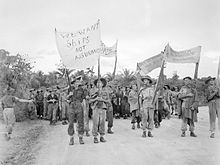Post-World War II demobilization strikes

Long-serving Australian military personnel at
Morotai protesting in December 1945 about delays in their repatriation to Australia and demobilization. 4,500 men took part in the protest.
Post-World War II demobilization strikes occurred within Allied military forces stationed across the Middle East, India and South-East Asia in the months and years following World War II. American military personnel based in occupied Germany were holding mass parades for speedier demobilization and in the Philippines formed soldiers committees and went on demonstrations calling for a return home [1]. In India, thousands of Royal Air Force servicemen pushed for demobilization and went on strike citing grievances over conditions of work such as deaths in high temperatures in Cawnpore (station: 322 MU Cawnpore) and overcrowding at RAF Jodhpur. A 'Forces Parliament' was set up - effectively a workers' council, but was dissolved before the issues came to a head. The issue was a major subject of debate in the British Parliament. At one point Prime Minister Clement Attlee was presented with a petition by India-stationed servicemen that stated:
–We have done the job we joined up to do. Now we want to get back home, both for personal reasons and because we think it is by work that we can best help Britain. No indication has been given of when we will see our families again. Is it because the government wishes to talk tough with other powers?–
The Conservatives demanded to know whether the new Labour government thought there was any difference between a strike and a mutiny. Some 'agitators' or strike leaders were jailed, but public pressure through MPs led to their early release or reduction in sentences [2]
[edit] References
[edit] See also
[edit] Further reading
David Childs, Britain Since 1945. Routledge 2002 ISBN 0415393272
Related topics in the Connexions Subject Index
Military Demobilization –
Mutinies –
Soldiers –
Strikes
This article is based on one or more articles in Wikipedia, with modifications and additional content contributed by
Connexions editors. This article, and any information from Wikipedia, is covered by a
Creative Commons Attribution-Sharealike 3.0 Unported License (CC-BY-SA) and the
GNU Free Documentation
License (GFDL).
We welcome your help in improving and expanding the content of Connexipedia articles, and in correcting errors. Connexipedia is not a wiki: please contact Connexions by email if you wish to contribute. We are also looking for contributors interested in writing articles on topics, persons, events and organizations related to social justice and the history of social change movements.
For more information contact Connexions





